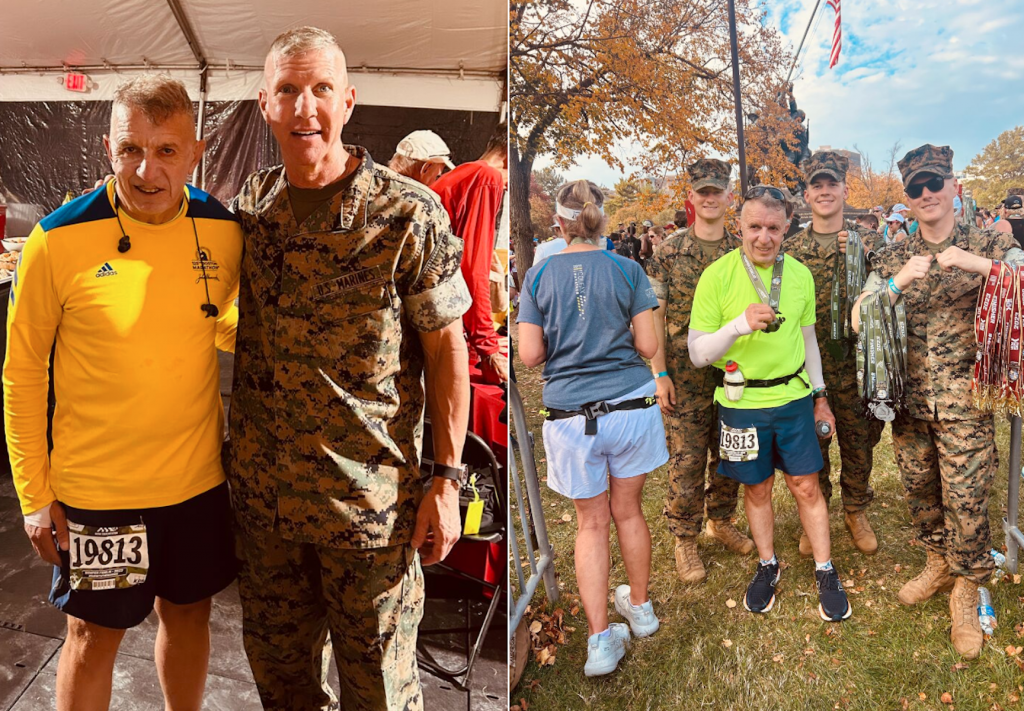Surpassing Goals During Cancer
- Marine Corps veteran Hank Donigan has not let brain cancer treatment get in the way of running 50 marathons this year to reach his lifetime milestone of 450 on New Year’s Eve — and intends to make it to 500 in 2024.
- The charitable survivor, who is employed at Camp Pendleton base in San Diego and raising funds for fellow veterans, is only five months out from his brain cancer surgery and is undergoing radiation five days a week through the end of January.
- Many survivors tell us that they discovered a newfound inner strength during or after their cancer battles, and often decide to set more goals and put their energy to even better use.
“I smashed all my expectations, so it’s my motivation to keep moving,” Donigan, 68, told Fox News Digital on Friday as he preps for his final race in Phoenix at the Across the Years multi-day running event. “I do it for the wounded warriors [and] their families.”
Read More
Fueled by his desire to give back, “I wanted to do something for organizations like the Semper Fi & America’s Fund, so that’s what I’ve been doing for the past decade,” he added.
The former colonel, who said he is very grateful for the health benefits he has received from the Marine Corps, was on active duty for 30 years, working in 45 different countries over the span of his service.
“It was a great adventure, I can tell you that.”
Now in remission, Donigan intends to run another 50 marathons in 2024 to hit 500. Running keeps him physically and mentally active, as he said he also suffers from PTSD, which stands for post-traumatic stress disorder, which is unfortunately common for service men, women and their families to experience, which is why the cause means so much to him.

“I’m getting older every day, but I thing I can do 500, and I think I can hit and surpass my monetary goal for the fund,” the husband and father of five said as he approaches his $101,977 goal. “There are no limits to what you’re able to do if you have the hope that you can do it.”
In the meantime, Donigan said he’s “very optimistic” that his cancer won’t come back.
Marine Corps Combat Vet Beat Cancer, Now Helps Other Vets Battling the Disease
Signs And Symptoms of a Cancerous Brain Tumor
The signs and symptoms of a cancerous brain tumor can vary greatly based on the size, spread, and location of the cancer.
As a result, some individuals will not feel any real effects for some time while others will start to show symptoms almost immediately after the cancer starts to grow.
Common symptoms include:
- intense and frequent headaches
- intense pressure similar to a sinus infection
- seizures
- body tremors
- nausea
- fatigue
- sudden changes in behavior
- shifts in personality
- short-term memory loss
- weakness of the legs and/or arms in one side of the body
- blurred vision
- difficulty speaking and remembering words
Individuals who experience multiple symptoms for any extended period of time should schedule an appointment with their doctor.
Setting Life Goals During Cancer
Many survivors tell us that they discovered a newfound inner strength during or after their cancer battles, and often decide to set goals and put their energy to better use.
“I know it sounds funny but I never would have even considered running a marathon if I didn’t have cancer,” Carrie Kreiswirth told SurvivorNet.
Carrie explained that she struggled a lot while she was undergoing treatment for breast cancer. She started feeling run down during chemotherapy and felt like she lost a part of herself. So how did she turn it around?
“I got to a certain point where I just started making certain shifts and certain changes and slowly, but surely, I have started to feel more like myself than I ever had,” Carrie said.
“I changed a lot of my eating habits, I changed my exercise habits. Running a marathon was certainly a lofty goal to set for myself, but I needed that. I needed to know that I could do that … and if I had gone through cancer and come out the other side, then I could do anything.”
Learn more about SurvivorNet's rigorous medical review process.
